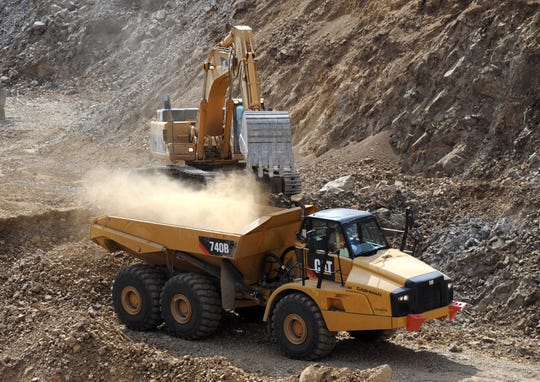Published 7:15 a.m. PT May 31, 2021 |
SHUT DOWN
A mineral ore truck is loaded with material in an open pit mine. (Photo by: Andy Barron / RGJ File)
CARSON CITY – Nevada lawmakers tabled a proposal late Saturday to impose additional taxes on mining that opens the door for consensus between an industry that has long sought to protect its unique tax structure and reformers who run government spending want to raise for education.
Under a deal brokered by lawmakers from both parties, mining lobbyists, and the state’s largest teachers union, the state will pour more dollars from its net income tax on minerals into education and add a gross income tax that is tiered and only for mines that applies to gross more than $ 20 million a year. The legislative period ends on Monday at midnight.
Mines reporting gross sales of $ 20 million to $ 150 million will be charged a 0.75% excise tax, while mines reporting higher amounts will be charged a 1.1% tax. The gross income tax applies only to silver and gold mines, excluding other minerals such as gypsum, lithium, or copper, and provides much of the education funding.
Tire Gray, president of the Nevada Mining Association, said he couldn’t explicitly support a tax hike. But the measure introduced on Saturday, which does not include a sunset clause, “is really meant to be a definitive answer to whether or not mining is paying its fair share,” he said.
“There are people who will say that the mining industry hasn’t paid its fair share. This bill will guarantee that this argument is no longer viable,” he said.
He said the industry had preferred the current proposal on the table to the three tax proposals launched last summer that would have generated annual sales of $ 147 million to $ 607 million. Congregation spokesman Jason Frierson said Saturday’s proposal would generate an estimated $ 170 million every two years.
Since the prospect of silver in the 19th century, there have been violent disputes over the taxation of mining in the state. The state constitution has since stipulated that mining companies must be taxed with less than 5% of the so-called net proceeds – profit minus deductions for certain costs.
The state’s mines produced $ 8.2 billion worth of silver, copper and other minerals in 2019 – more minerals from non-fossil fuels than any other state. That year they collectively paid $ 61 million in taxes to the state.
Since neither Republicans nor Democrats control the two-thirds majority required to collect taxes in Nevada, the passage is supported by both parties. In an impromptu meeting of the Ways & Means committee in the assembly, the legislators of both parties supported the introduction of the bill. Nevertheless, both chambers must be evacuated by two-thirds majorities.
Senate majority leader Nicole Cannizzaro said there were “ongoing negotiations” and had not closed the door to the resolutions passed last summer if discussions worsened. She was optimistic about the prospect of providing additional funding to schools.
“I think asking for extra income from mining is an investment in our children,” she said.
In the past, Republicans have argued that mining is an integral part of the rural economy and taxing too high could jeopardize thousands of jobs in both mines and companies that care for workers and their families.
Progressive activists point out how Nevada ranks in K-12 education spending per student (44th) and health spending per capita (48th) compared to other states, saying mines can afford to pay more. They celebrated the introduction of the bill on Saturday evening as progress.
“While we continue to push for what Nevadans really deserve, this proposal will sensibly address people’s needs and give our state the funding needed to immediately maintain and build on critical public services,” Laura said Martin, the executive director of the Progressive Leadership Alliance of Nevada.
The mining tax reform fell one vote below two-thirds of the approval required for passage through the statehouse last summer. But as consolation with simple majorities, the democratic legislature decided to take the first step to push proposals on mining tax for the 2022 vote.
During the second half of the legislature, mining industry officials and Democratic Party officials have stated that they would prefer to reach a compromise in Carson City rather than risking the uncertainty of an electoral move whose presence could affect other races down the ticket.
Although Republicans are in the minority in both Senate and Assembly, they hope the two-thirds tax proposal requirement gives them the power to make concessions to the Democrats.
In return for their support, Republicans have asked to return educational initiatives such as Opportunity Scholarships, which the then Republican majority launched in 2015 to enable low- and middle-income families to pay for private schooling. Democrats decided to downsize the program in 2019 and the proposal overturns that decision.
___
Sam Metz is a corps member of the Associated Press / Report for America Statehouse News Initiative. Report for America is a not-for-profit national service program that lets journalists report undercover issues to local newsrooms.
Read or share this story: https://www.rgj.com/story/news/politics/2021/05/31/plan-would-increase-taxes-mining-pour-more-funds-into-education/5279367001 /